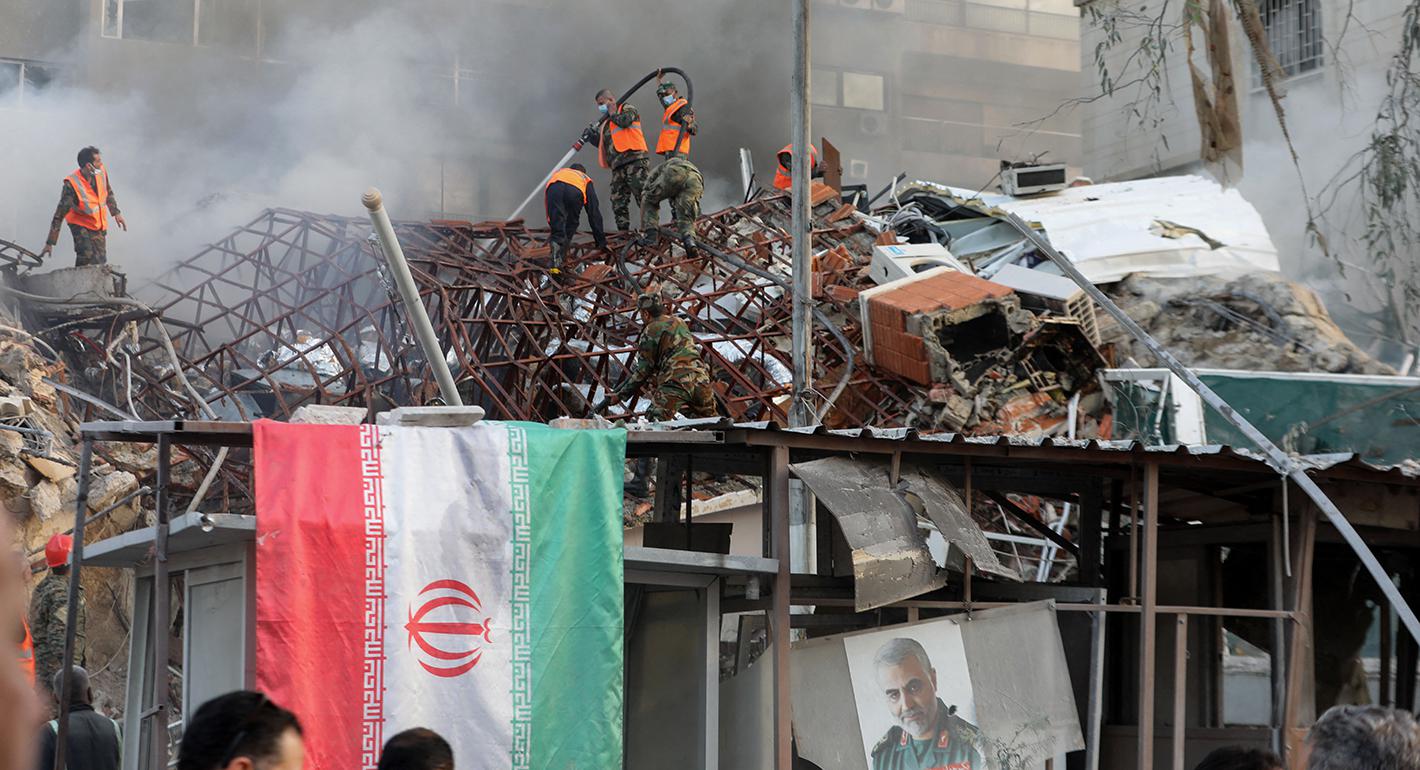What Happened?
On April 1, Israel targeted Iran’s diplomatic mission in Damascus, Syria, though the Israelis have not commented officially on whether they were behind the attack. Seven members of the Islamic Revolutionary Guard Corps’ (IRGC) Quds Force were killed in a precision airstrike that reportedly wiped out the force’s leadership responsible for Lebanon, Syria, and Palestine. This included Brig. Gen. Mohammed Zahedi, the Quds Force’s commander for Syria and Lebanon, Gen. Hossein Aminullah, the Quds Force’s chief of staff for Syria and Lebanon, and Maj. Gen. Mohammed Hadi Haj Rahimi, the commander for Palestine.
Zahedi was a veteran IRGC official, who previously commanded its ground and air forces. He worked closely with Hezbollah in Lebanon, being the only non-Lebanese member of its Shura council, as well as with the regime of Syrian President Bashar al-Assad and his intelligence services. A previously unseen photograph released by the ICRG showed him with Qassem Soleimani, the late Quds Force commander, Ahmad Kazemi, another IRGC commander, as well as with Imad Mughniyeh, the late Hezbollah leader, and Sayyid Hassan Nasrallah, Hezbollah’s secretary general, highlighting Zahedi’s importance. Zahedi was accused of being the principal power broker and weapons disseminator to Iran’s partners and proxies in the region, and had been sanctioned by the United States, the United Kingdom, and the European Union, among others.
Why Is It Important?
One cannot understate the relevance of this move. Shadow wars between Israel and Iran as well as between the United States and Iran have been going on for decades and have included cyberattacks and the assassination of Iranian nuclear scientists. Israel has also been bombing Iranian and Hezbollah positions in Syria for the past several years, targeting weapons shipments, storage facilities, and militants.
Since the Hamas attack of October 7 last year, Israel has adopted a far more aggressive strategy in Syria, targeting IRGC officials in the heart of Damascus, as well as expanding the geographical scope of its operations to include Lebanon. Hundreds of Hezbollah members have been killed in the past six months in Lebanon and Syria. On March 29, an Israeli attack near Aleppo airport, which killed dozens of Syrian soldiers and members of Hezbollah, was seen as one of the strongest conducted by Israel to date.
In destroying the Iranian diplomatic building in Damascus, Israel launched a direct attack against sovereign Iranian territory. In the process, it also broke international law, transgressing an important red line. The gravity of the matter drove the United States to immediately issue a statement saying that it was not involved, nor did it have advance warning that such a strike would occur. Israeli and U.S. officials had a slightly different story, stating that Israel had notified Washington moments before the attack happened, but had not asked for an American green light. Regional powers such as Saudi Arabia and the United Arab Emirates were also quick to condemn the attack, fearing that it would lead to an escalation in regional tensions. The bombing of the Iranian embassy complex also caused significant anxieties among foreign embassies in the region, many of which felt that it set a precedent that diplomatic missions were no longer reliable sanctuaries.
What Are the Implications for the Future?
What happens next will depend on two factors. The first will be the international response to the attack, which could influence the second factor, namely how Iran will retaliate. A strong diplomatic reaction by the international community, and more specifically by the United States, is urgent at this point. Thus far, with seeming impunity, Israel has devastated Gaza, killed more than 32,000 Palestinians, attacked hospitals, educational facilities, public archives, and other civilian infrastructure, as well as killed scores of United Nations staff, almost a hundred journalists, and yesterday seven international aid workers. The country’s actions have pushed the region into an escalatory path that could set it afire and drag the United States into a generalized conflict it has said it does not want. The Biden administration’s policy toward Gaza and President Joe Biden’s so-called “bear hug” of Israeli Prime Minister Benjamin Netanyahu, purportedly intended to better control him, appear to be failing as the risk of a widening conflict increases.
The attack against the Iranian consulate is also a reflection of how the conflict in Gaza has helped to transform the rules of war, as well as lower the threshold for what the international community will accept. Were attacks such as these to become normalized—whether the systematic razing of large swaths of Gaza as well as civilian and humanitarian infrastructure there, or more attacks against diplomatic establishments in the region—this could very well represent a decisive nail in the coffin of a rules-based international order.
Iran’s response will also determine what happens next. In the past, Iranian retaliation for attacks against it personnel was focused on striking Israeli facilities outside of Israel, such as the alleged Mossad base in Erbil, Iraq, in January 2024. This response was in line with its policy of avoiding an all-out regional war, a reflection of which has been Hezbollah’s relatively cautious responses to Israeli attacks in Lebanon. Iranian prudence has also been seen in its decision since February to urge its proxies to avoid provoking U.S. forces in Iraq and Syria. This followed the killing of three U.S. servicemen in a drone attack near the Jordanian border last January. Some 180 attacks were recorded against U.S. positions between October and February.
Needless to say, the region today is a tinderbox, and the gloves seem to be coming off. Unless Israeli actions are reined in quickly, the worst may be yet to come.








